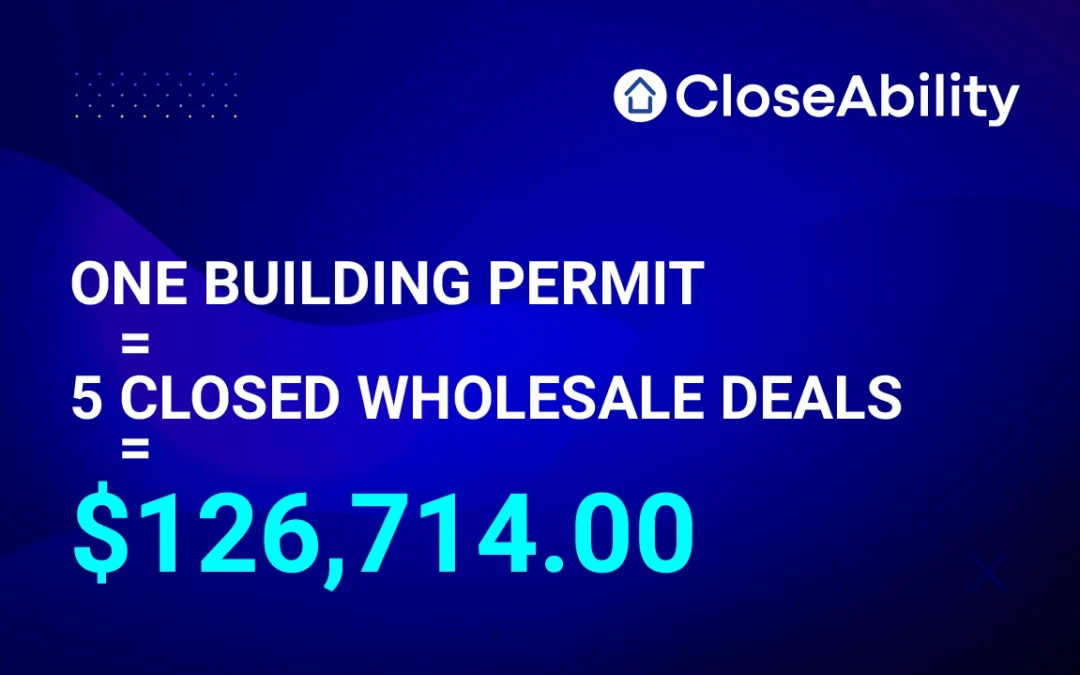
How One Building Permit Unlocked $126,714 in Wholesale Real Estate Profits
In the world of distressed real estate investing, seeing what others can’t is the difference between barely breaking even and closing five deals worth over $126,000 in profit.
This is the story of how one strategic insight — tracking a single building permit — led to the acquisition and wholesale of five high-margin properties, and how that same strategy can be replicated using CloseAbility’s proprietary workflows, AI, and CRM integrations.
The Hidden Power of Building Permits
It started with a pattern many investors overlook: new development permits. A particular city issued a building permit for a major expansion — a multi-million dollar upgrade to a Veterans Affairs hospital. Most investors ignored it. But someone with the right system in place saw it differently: as a signal that the surrounding neighborhood was about to rise in value.
Building permits are public records. With the right workflows, they can become roadmaps. In this case, the permit revealed a coming transformation in an overlooked area — and by acting before others saw the upside, the investor was able to secure multiple properties for well below their future value.
Monitoring: The Advantage Most Investors Lack
What made the difference was more than just noticing the permit. It was the long-term monitoring of neighborhoods where previous profits had been made — a feature CloseAbility bakes into every user’s experience through its “Monitor Stage.”
Most investors close a deal and move on. CloseAbility keeps watching. When a new opportunity arises — whether through a building permit, a title change, or a legal filing — CloseAbility’s system sends alerts so users can act before anyone else.
In this case, three years after an initial $24,000 profit from a flip, the system picked up the VA hospital development. The area had already proven profitable — now it was about to explode.
From One Permit to Five Deals
The permit signaled an opportunity: a developer needed to acquire 13 parcels of land from unrelated owners to complete a large-scale housing project. But some parcels had legal and title issues, and others had absentee or uncooperative owners.
That’s where CloseAbility’s pre-built workflows made the difference. The investor segmented cooperative vs. non-cooperative owners using Audience Igniter, deployed skip tracing with enhanced analytics, and ran an “Acquire Wholesale to Developer” workflow — the most profitable strategy in this scenario.
Over time, five parcels were acquired and wholesaled back to the developer, earning profits ranging from $5,000 to $42,000 per transaction. One deal netted $30,000 due to a unique legal situation with the property title. Altogether, the workflow generated $126,714 in net profit — and it’s still running today.
Why Developers Are Key to Scaling
Most wholesalers chase individual flippers or landlords. But developers bring institutional capital and a long-term vision, which means higher margins and less negotiation friction.
CloseAbility helps users identify these buyers and target them through the platform’s AI-driven analytics. When a user can align with a developer’s needs — as happened in this story — they can provide exactly the properties the developer needs to complete a project. That means faster closes, higher prices, and repeat deals.
Scaling with Confidence Through AI and CRM Integration
CloseAbility is the first SaaS platform integrated with Equator, the leading portal for short sale transactions. This unique advantage allows users to automate deal tracking, avoid bad transactions (based on over 3,500 failed case studies built into the system), and answer four critical questions on every deal:
- Will the transaction close?
- How much money can I make?
- How fast can I get paid?
- What stands in the way of closing?
From there, CloseAbility’s CRIO AI (Chief Real Estate Investment Officer) takes over — guiding users through each step of the transaction like Waze or Google Maps guides a driver.
This approach doesn’t just simplify real estate investing. It turns it into a repeatable, scalable business that can be run on autopilot.
Long-Term Gains and Community Impact
Beyond personal profits, the workflow described here brought over $755,000 in investment into the local community. Historic homes were restored, new homeowners gained access to subsidized mortgage rates, and neighborhood property values rose.
With CloseAbility, these aren’t isolated stories — they’re systems users can run every day. From identifying overlooked areas with hidden upside to tracking permits, legal distress, or inheritance issues, the platform delivers actionable insights that put users steps ahead of the competition.
Final Thoughts
If you’re a real estate agent or investor looking to scale in the short sale and pre-foreclosure market, CloseAbility isn’t just a tool — it’s a system built from real-world experience, trained on thousands of transactions that didn’t close so you can focus on the ones that will.
And all it might take is spotting the next building permit before anyone else does.

